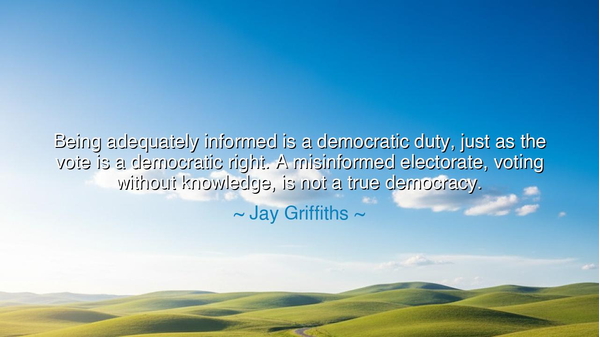
Being adequately informed is a democratic duty, just as the vote
Being adequately informed is a democratic duty, just as the vote is a democratic right. A misinformed electorate, voting without knowledge, is not a true democracy.






The words of Jay Griffiths strike like a bell tolling over the republic: “Being adequately informed is a democratic duty, just as the vote is a democratic right. A misinformed electorate, voting without knowledge, is not a true democracy.” In this truth lies both the glory and the peril of self-government. For the right to vote, though sacred, is but half the covenant of democracy. The other half is the duty to be informed, to seek truth diligently, to weigh words carefully, and to cast a ballot not from ignorance or passion alone, but from the clear light of knowledge. Without this, the temple of democracy becomes a hollow shell, beautiful in form but crumbling in substance.
Griffiths reminds us that freedom is not given without responsibility. To live in a democracy is to bear both privilege and burden. The privilege is that no king nor tyrant decides our fate; the burden is that we ourselves must rise to the role of rulers. And rulers who are ignorant are more dangerous than rulers who are cruel, for ignorance blinds the many, and through their blindness, evil men may rise unchecked. Thus, to be informed is not a luxury of the educated few; it is the solemn duty of every citizen who would dare to call themselves free.
History bears witness to this law. In the twilight of the Roman Republic, when the masses were swayed not by reason but by bribes and the glitter of spectacle, men like Julius Caesar rose with promises that captivated the uninformed. Bread and circuses dulled the people’s judgment, and their votes became the tools of ambition rather than the voice of reason. In their ignorance, they traded liberty for tyranny. The Roman Republic did not fall in a single day of conquest; it rotted first in the hearts of its citizens who ceased to honor their duty to discern.
By contrast, recall the birth of the United States, when the Founders spoke of the necessity of an educated citizenry. Thomas Jefferson declared that a nation which expects to be ignorant and free “expects what never was and never will be.” He understood, as Griffiths does, that the ballot without knowledge is no shield against tyranny. It is but a weapon placed in the hands of the blind. And so, schools were built, newspapers flourished, and the pursuit of information was woven into the fabric of democracy. Yet even then, the warning remained: vigilance in truth is the price of liberty.
The deeper meaning of Griffiths’ words is that a misinformed electorate is worse than an uninformed one. To know nothing is dangerous, but to believe falsehoods as truth is to march willingly into chains. The spread of lies, propaganda, and manipulation does not merely weaken democracy—it corrupts it from within. For when the people cannot distinguish truth from falsehood, their votes cease to reflect their will; instead, they become the echo of those who deceive them. A democracy so poisoned is a democracy in name only.
What then must we do? Each citizen must become a seeker of truth, refusing to be content with shallow answers or easy slogans. We must read widely, question boldly, and weigh carefully the voices that seek to sway us. We must learn history, so as not to be deceived by those who would repeat its mistakes. We must honor facts above faction, reality above rhetoric, truth above tribe. To be adequately informed is not merely to know, but to care enough to search. It is to recognize that ignorance, whether chosen or imposed, is a betrayal of the republic.
Therefore, O listener, take this teaching into your heart: guard your mind as you guard your vote. For in democracy, the two are inseparable. To cast a ballot in ignorance is to wound the body of the nation; to cast it with knowledge is to strengthen its soul. Do not yield to complacency, for the enemies of truth are ever at work. Instead, arm yourself with understanding, so that when the hour of choice comes, you may not only vote as a right, but as a duty fulfilled.
For in the end, democracy is not sustained by ballots alone, but by the informed hearts and minds of its people. And if we honor both our rights and our duties, then democracy shall stand—not as a fragile dream, but as a living, enduring reality, handed down to future generations as both gift and responsibility. Seek truth, and you will safeguard freedom.






AAdministratorAdministrator
Welcome, honored guests. Please leave a comment, we will respond soon